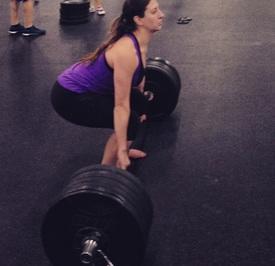Paradox: Unhealthy food is often easier to track.

segacs
Posts: 4,596 Member
The calorie counting paradox is that the easiest food to log and track is often the food that is less healthy.
For instance, packaged and processed food has the nutritional info printed right on the label, and can be logged with a simple bar code scan. Fresh cooking with real ingredients takes a lot more effort to log.
Ditto with restaurants: The only ones with nutritional info on their websites are the big fast food chains, which are obviously far less healthy than the local restaurants which provide zero information about their menus.
Do you ever find yourself making unhealthy food choices simply because they're more convenient to track than healthy ones? What are your strategies to deal with this?
For instance, packaged and processed food has the nutritional info printed right on the label, and can be logged with a simple bar code scan. Fresh cooking with real ingredients takes a lot more effort to log.
Ditto with restaurants: The only ones with nutritional info on their websites are the big fast food chains, which are obviously far less healthy than the local restaurants which provide zero information about their menus.
Do you ever find yourself making unhealthy food choices simply because they're more convenient to track than healthy ones? What are your strategies to deal with this?
0
Replies
-
No, not really. Pre-packaged foods, like chips, should still be weighed for accuracy.
Recipes can be annoying, but once it's in your recipe files it's there forever.0 -
I understand what you mean. I fell into a "pre-packaged snack" rut because of this a few years ago. To make healthier homecooked food easier to track, I make meals and recipes on here. I also tend to buy the same things over and over. I figure the easy way never did much good for me, so I am willing to put in the extra effort to ensure I am getting the exact nutrition I need for my goals.
**typo0 -
Guilty! But as it doesn't happen all that often, in the interests of being more accurate with my calorie counting, because I don't see the point of estimating, I prefer to eat a Big Mac than something with unknown nutritional info.0
-
Or you could go the other way, dont eat anything that has a bar code, then its all healthy0
-
Also, just because something is easier to log, doesn't mean it's accurate. The nutritional information on restaurant sites and even packaging can be as much as 20% off.0
-
I weigh stuff.0
-
What I do is guesstimate my healthier food choices. For instance, I was at a drafthouse the other day and ordered their greek salad w/tofu. So, I found something similar to this in the database. I'll also sometimes track item by item using this system. Not ideal, but even if I'm a little off, beats not logging or going overboard w/my choices.0
-
Pre-packaged food is inaccurate. It also has to be weighed and measured.
I'm finding it much easier to track home made meals from raw ingredients.0 -
Not so much making unhealthy options as choosing restaurants differently. I generally won't go to one that doesn't publish this information unless I'm left with little other choice.0
-
Exactly what Paige682 said. I tend to make recipes more than once, so once I log it, it's super easy the next time. You should still be weighing your pre-packaged food to make sure you're getting the correct serving size. Even then, they're allowed a certain degree inaccuracy on the nutrition label.0
-
You should still weigh pre-packaged stuff and there are no unhealthy/healthy foods. There is just food.0
-
I totally know what you mean. But I have found that since I tend to eat the same things fairly often, even home-cooked stuff, once I get the recipe into my foods I'm ok. As for the local restaurants... I can usually find the foods (Maybe from other places, but it's still the same food for the most part). But I go for things like bacon and eggs, Greek chicken salad, so finding those things is pretty straight forward. You might have to search or play around a bit with the logging but that takes a bit of time but once you build your food list you are generally pretty set.0
-
-
I agree. And it tends to make your diet more repetitive. Case in point: went to a wedding last week and almost gave up on trying to track all the different foods I was having.0
-
No, not really. Pre-packaged foods, like chips, should still be weighed for accuracy.
Recipes can be annoying, but once it's in your recipe files it's there forever.
If I need to log a meal I've made.. I just have my phone with me and weigh and log as I go, or a notebook to right down each time I add something and how much.. Helps to just jump on the computer and log it all after
0 -
I do usually weigh pre-packaged food as long as I'm at home. Ditto with recipes I cook myself. Obviously, if I'm out and about, or eating at someone else's house, that's harder to do. But I try.
But it still rubs me viscerally the wrong way, though, to think that any weight loss scheme would lead someone to choose McDonald's as opposed to a healthy local bistro.0 -
I do eat processed foods, but I'd rather eat my grandmother's lasagna than a crappy frozen lasagna just because the latter has a label. This means I'm not 100% accurate with my logging, but I'm fine with it and I'm still losing weight.
I usually look for something similar in the database and don't sweat it.
0 -
Eat part of a bag of chips - I don't know how much to log.
Eat one chicken breast of 6 (all similar in size) in a package that weighed 36 oz. Log as 6 oz.
So, no, it's really not.0 -
I do usually weigh pre-packaged food as long as I'm at home. Ditto with recipes I cook myself. Obviously, if I'm out and about, or eating at someone else's house, that's harder to do. But I try.
But it still rubs me viscerally the wrong way, though, to think that any weight loss scheme would lead someone to choose McDonald's as opposed to a healthy local bistro.
If someone is choosing to eat at a McD's instead of local bistro, I think it goes beyond ease of logging.0 -
I worked at a fast-food chain and I can tell you there is no way the nutritional info is accurate. Depending on who is preparing the burger, the amount of sauce and stuff is completely different. Even the same person will do things differently because we cannot be consistent (we have to go fast!!).
Even for meat... we are supposed to let the grease drain a bit, but you have to be really fast so it goes into the bun right away and the grease goes with it.
And one serving of fries isn't always the same weight (we don't weigh it and again have to be fast).
So... yeah... not accurate.0 -
There are no unhealthy/healthy foods. There is just food.
Untrue IMHO. There are calories that are nutrient-dense, and calories that are nutrient-empty.
What's true is that there's no "good" food or "bad" food. But if I'm trying to get a balanced nutritious diet into 1300 calories, I'd prefer not to waste them on "empty" foods wherever possible.0 -
I worked at a fast-food chain and I can tell you there is no way the nutritional info is accurate
Such an important point, thank you!
I do think, though, that at least it gives you a starting point with which to estimate. If the nutritional info is off by 20% or so, it's closer than the total pie-in-the-sky guess of trying to log a restaurant meal where you have zero information to go on.0 -
I have found that once you get into the healthy eating routine and it becomes a habit, then logging in healthy food is just as easy as unhealthy food. I weigh it or measure it. When I go out to eat at a local restaurant I've gotten pretty good at finding comparable foods on restaurants that publish their nutritional information. Since I weigh and measure a lot at home, I've gotten pretty good at eye balling what 4 oz. of meat looks like or 2-3 cups of salad looks like. You can ask for dressing on the side or even ask for substitutions that are more healthy than what comes with the meal. Waiters are usually very accomodating. I have entered a lot of homemade recipes on MFP and that really makes it easy.0
-
I worked at a fast-food chain and I can tell you there is no way the nutritional info is accurate
Such an important point, thank you!
I do think, though, that at least it gives you a starting point with which to estimate. If the nutritional info is off by 20% or so, it's closer than the total pie-in-the-sky guess of trying to log a restaurant meal where you have zero information to go on.
See, this is where I disagree with you. If you blindly accept a restaurants counts because it seems easier, then you are willingly accepting a 20% variance and telling yourself it's ok, which may lead to eating out more. On the other hand, if you order a 6oz steak, side salad and a baked potato, you can get pretty close by logging each item separately. Obviously, this is harder to do with a lot of other dishes but, then, if you are out for a nice dinner just go for it within reason and get back on track the next day.0 -
I agree with you! I try and choose frozen entrees from the "health food" aisle. Amy's, Dr Praegers, Quorn, American Flatbread pizzas, and some other brands have become my go to. Not sure how much better it is but it can't be worse than what is in the regular section!0
-
No, if I buy fresh fruits and veggies from the farmer's market, they don't have bar codes. If I buy fresh cheese from my local cheese shop, it doesn't have a bar code (or if it does, it's just an in-store code and not a UPC). If I eat my mom's cooking, it doesn't come with a bar code.
I think this advice is similar to the "shop the edges" advice of tacking a grocery store. The healthiest stuff -- fruits, veggies, fresh foods -- tend to be on the edges, while the unhealthy cookies and high sugar and trans fat content processed foods tend to be in the centre aisles. Not true of every store, of course, but you get the idea. The whole point is that cutting back on processed foods and eating more "real" food (for lack of a better term) tends to be more filling and nutritious.0 -
yes- being smart about nutrients and macros can help. But it's not FAKE food otherwise- there is no reason to be arbitrary lables on stuff- you're over complicating it.
lower calorie food- with a macro pay off that leaves you full is a win- but that doesn't make my Red Baron frozen pizza "fake"
it's a choice- life is about making choices. Sometimes you can buy the nice coat and sometimes you can buy the old navy fleecy so I can go watch a movie later with my BF. I mostly buy the old navy fleecy to save money for other things. but sometimes- it's worth buying the high end coat.
You just have to know how to spend your calories and what works for sustainability- calling it real/fake/processed/whole/clean/pure or otherwise doesn't teach people that.0
This discussion has been closed.
Categories
- All Categories
- 1.4M Health, Wellness and Goals
- 398.2K Introduce Yourself
- 44.7K Getting Started
- 261K Health and Weight Loss
- 176.4K Food and Nutrition
- 47.7K Recipes
- 233K Fitness and Exercise
- 462 Sleep, Mindfulness and Overall Wellness
- 6.5K Goal: Maintaining Weight
- 8.7K Goal: Gaining Weight and Body Building
- 153.5K Motivation and Support
- 8.4K Challenges
- 1.4K Debate Club
- 96.5K Chit-Chat
- 2.6K Fun and Games
- 4.8K MyFitnessPal Information
- 12 News and Announcements
- 21 MyFitnessPal Academy
- 1.6K Feature Suggestions and Ideas
- 3.2K MyFitnessPal Tech Support Questions


















